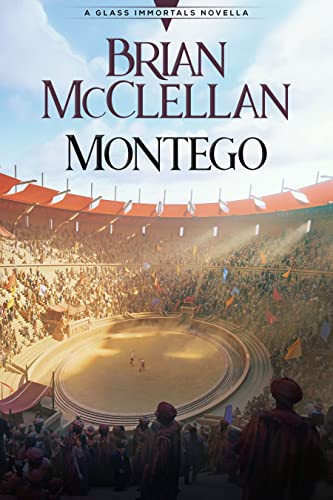 Montego: A Glass Immortals Novella by Brian McClellan
Montego: A Glass Immortals Novella by Brian McClellan Format: ebook
Source: purchased from Amazon
Formats available: ebook
Genres: epic fantasy, fantasy, gaslamp, steampunk
Series: Glass Immortals #0.5
Pages: 121
Published by Brian McClellan on May 23, 2023
Purchasing Info: Author's Website, Amazon, Barnes & Noble, Kobo
Goodreads
Twelve year-old Montego al'Bou is an orphan, a provincial peasant boy left alone by the recent death of his grandmother. Possessing nothing more than his grandmother's cudgel, he strikes out to the capital where the influential Grappo have offered to bring him up in the luxury of an Ossan guild-family. He finds his welcome frosty, his new home full of confusing responsibilities.
He quickly discovers that the greatest sin in the capital is to be born without money, and the classist elite will not hesitate to remind him of his humble origins. Montego dreams of being his own man, of making it in the cudgeling arenas of the Empire's deadly spectator sport where even a provincial can be worshipped like a god. But skill isn't the only barrier for a wannabe cudgelist. Without allies, cunning, and a helping of daring, he can't hope to make it in the capital.
My Review:
I picked this up because In the Shadow of Lightning gave me one of those epic book hangovers that lingers LONG after the last page is turned. Lightning is the first book of the Glass Immortals series, so I know that there will be more books to scratch that particular itch – but that doesn’t mean there are even any clues as to when that will occur.
But in the meantime there’s Montego, a combination prequel novella and origin story for one of the primary characters in at least that first book in the series. Or so it seemed when I bought it a couple of weeks ago.
Instead of being merely the origin story for champion cudgelist ‘Baby’ Montego, this is the story of Montego’s first days in the city of Ossa, when this boy from the provinces first met both Demir Grappo and Kizzie Vorcien, and the three children – and they were still children no matter how mature both Demir and Kizzie were forced to act and had come to be – forged a friendship that has the possibility of carrying through for the rest of their days.
It’s the story of how three became one – before politics and time and vastly different stations and personal ambitions and other people’s political shenanigans and political corruption – and did I mention politics? – came between them.
So, on the one hand, we have a lovely story about a boy very much out of his depth, figuring out how he can become who he already knows he wants to be when he grows up – in spite of the many, many decks stacked against him. We’re with him, seeing his world from his very much outsider perspective, as he learns to stand up for himself and his friends and take the blows that life and politics (yes, that again) send his way.
And very much on that other hand, we have the story of a band of unshakeable allies, when they were young and still at least a bit innocent, coming together to take on all comers – before their world and all the enemies in it do their damndest to shake them apart.
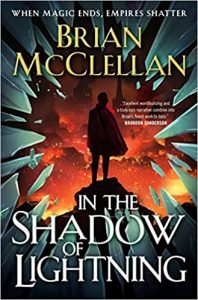 Escape Rating A: I had the oddest reaction at the end of Montego. I teared up. Not because this story ends on a sad note, because it doesn’t. It ends on a note of triumph and hope. But I wanted to cry because I know what those hopes lead to, and there’s a lot of heartbreak ahead for Demir, Montego and Kizzie. They just don’t know it yet.
Escape Rating A: I had the oddest reaction at the end of Montego. I teared up. Not because this story ends on a sad note, because it doesn’t. It ends on a note of triumph and hope. But I wanted to cry because I know what those hopes lead to, and there’s a lot of heartbreak ahead for Demir, Montego and Kizzie. They just don’t know it yet.
But those of us who have read In the Shadow of Lightning most certainly do.
Which leads to a bit of a dilemma. Because on my third hand, this is a prequel. It is possible to read this without having read Lightning and enjoy it as the story it is on its face. But in that fourth hand I’m holding behind my back, the one with the cudgel in it, what makes this story rise is that if you’ve already read Lightning you know that the fall is coming and it’s epic and bitter and tragic with only the barest hint of hope on the horizon.
So I fell into Montego hard, and was more than a bit choked up at the ending because I know what’s coming and I know that Montego, Demir and Kizzie do not. But I don’t know nearly enough and ‘Glassdamn’ as the characters in this world frequently curse, I can’t wait to find out.

 A Thousand Recipes for Revenge by
A Thousand Recipes for Revenge by  Escape Rating A+: I picked this up because I was looking for something else with magical cookery after
Escape Rating A+: I picked this up because I was looking for something else with magical cookery after 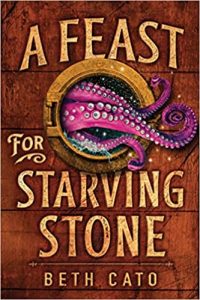 Ada and Solenn give readers two heroines to route for, as this is both Ada’s story of picking up the pieces of the life she left behind and Solenn’s coming of age story and both are fantastic. The world’s setup at first seems fairly standard epic fantasy and then goes to places that are fresh (if occasionally rotting) and new and unexpected. There are bits of Bujold’s
Ada and Solenn give readers two heroines to route for, as this is both Ada’s story of picking up the pieces of the life she left behind and Solenn’s coming of age story and both are fantastic. The world’s setup at first seems fairly standard epic fantasy and then goes to places that are fresh (if occasionally rotting) and new and unexpected. There are bits of Bujold’s 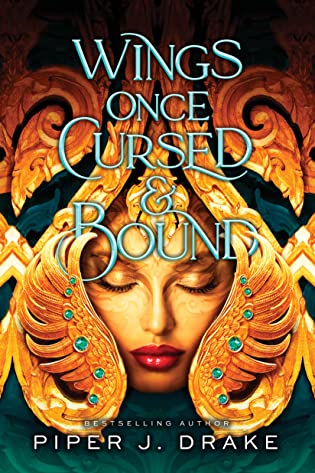 Wings Once Cursed and Bound (Mythwoven, #1) by
Wings Once Cursed and Bound (Mythwoven, #1) by 
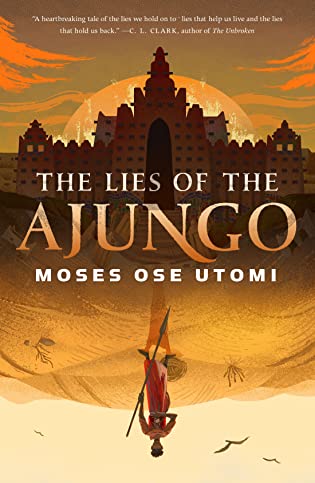 The Lies of the Ajungo (Forever Desert, #1) by
The Lies of the Ajungo (Forever Desert, #1) by 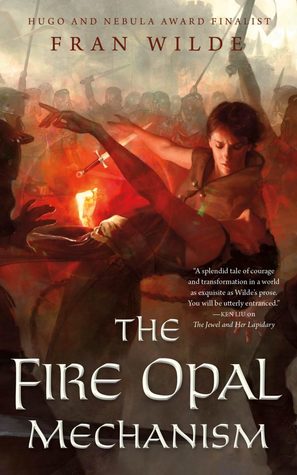 The Fire Opal Mechanism (Gem Universe #2) by
The Fire Opal Mechanism (Gem Universe #2) by 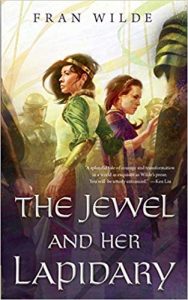 Escape Rating A-: At first, and for a rather long time thereafter, it seems as if the core of The Fire Opal Mechanism is about the freedom of information versus the censorship of it. And yet, at the beginning – the beginning that Ania and Jorit observe and not the place where they personally start – that wasn’t actually the case.
Escape Rating A-: At first, and for a rather long time thereafter, it seems as if the core of The Fire Opal Mechanism is about the freedom of information versus the censorship of it. And yet, at the beginning – the beginning that Ania and Jorit observe and not the place where they personally start – that wasn’t actually the case.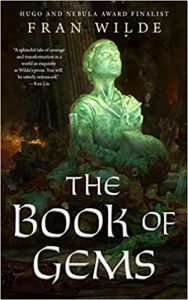 That their harrowing journey together bonds Ania and Jorit in their own mutual truth is the sparkling icing on a very tasty and thought-provoking little book-cake.
That their harrowing journey together bonds Ania and Jorit in their own mutual truth is the sparkling icing on a very tasty and thought-provoking little book-cake.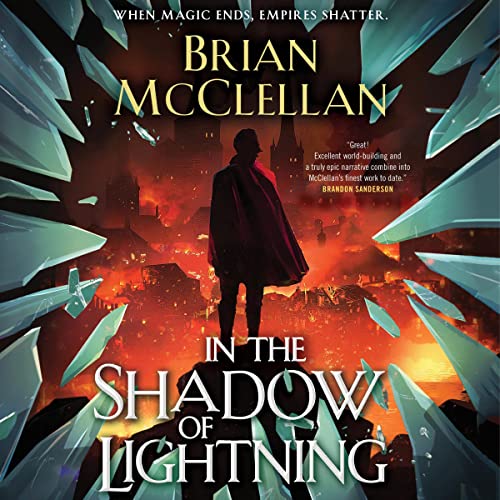 In the Shadow of Lightning (Glass Immortals, #1) by
In the Shadow of Lightning (Glass Immortals, #1) by 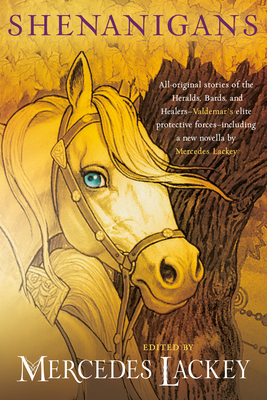 Shenanigans (Tales of Valdemar, #16) by
Shenanigans (Tales of Valdemar, #16) by  Last week’s
Last week’s 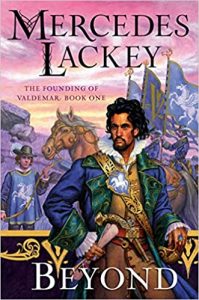 Of course, there are also several stories set among the students of the Collegium, because, well, students and pranking make for a fun story no matter what world they’re set in.
Of course, there are also several stories set among the students of the Collegium, because, well, students and pranking make for a fun story no matter what world they’re set in.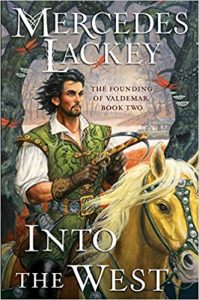 Last but not least there’s, Diana Paxson’s “One Trick Pony”, which mixes a bit of the bittersweet memory of heartbreak and the horrors of war into its story about a man who has found peace after grief and war by gardening, and the way that peace is invaded by a woman who reopens his heart and a newly born Companion who is learning the limits of their own power one prank at a time.
Last but not least there’s, Diana Paxson’s “One Trick Pony”, which mixes a bit of the bittersweet memory of heartbreak and the horrors of war into its story about a man who has found peace after grief and war by gardening, and the way that peace is invaded by a woman who reopens his heart and a newly born Companion who is learning the limits of their own power one prank at a time.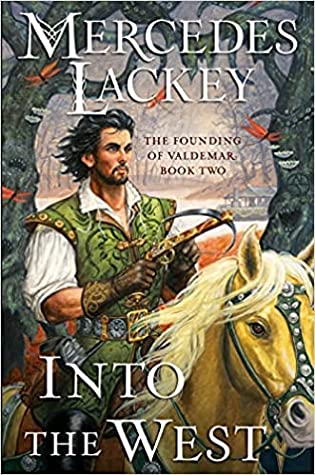 Into the West (The Founding of Valdemar, #2) by
Into the West (The Founding of Valdemar, #2) by  We already knew the destination. What Valdemar is, what it became, seemed fully formed all the way back in
We already knew the destination. What Valdemar is, what it became, seemed fully formed all the way back in 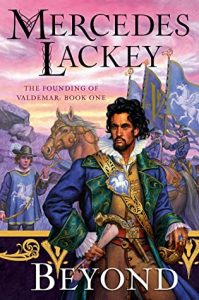 Escape Rating B: If you’ve read
Escape Rating B: If you’ve read  The one signature feature of the entire
The one signature feature of the entire 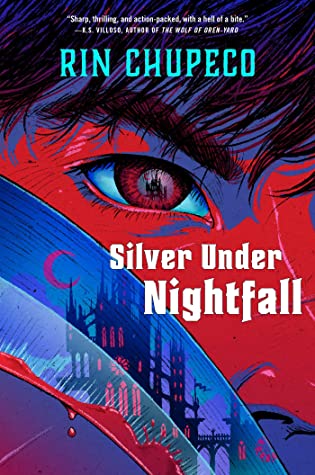 Silver Under Nightfall by
Silver Under Nightfall by 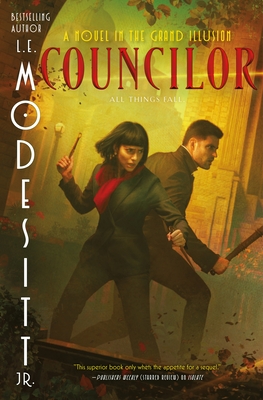 Councilor (The Grand Illusion #2) by
Councilor (The Grand Illusion #2) by 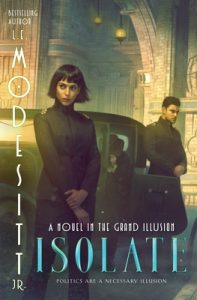 Escape Rating A: Just as with the first book in the series,
Escape Rating A: Just as with the first book in the series,